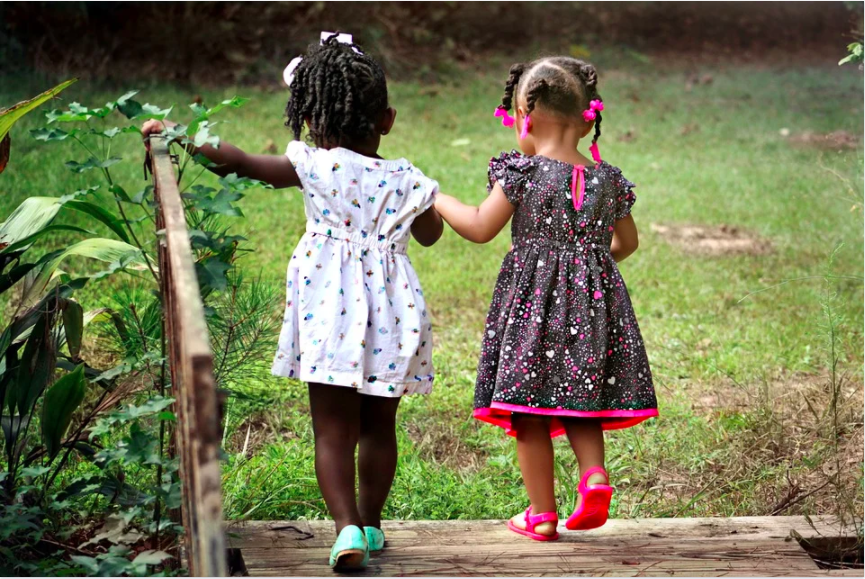As the mother of a three-year-old and an eighteen-month-old, I can confirm that figuring out when and how to talk to your young kids about race and racial tensions is really hard. I want to make sure that my kids are antiracists in this world, people who stand up for people who are treated differently because of the color of their skin, but I don’t feel qualified to teach them how, exactly to do that at their ages.
I’m glad, then, that there are experts out there willing to help all of us parents figure out to navigate these tough topics with our kids.
First of all, if you’re the parents of white kids, know that having the conversation is important. Colorblindness is not the goal, so there’s nothing wrong with pointing out that people have different colors of skin – your friends of color and their kids don’t have the luxury (or privilege) to pretend everyone’s experience is the same, so neither should you.

Image Credit: Pixabay
“White parents must take the lead from parents of color, who begin speaking to their children about the realities of race from toddlerhood,”says Ilyse Kennedy, a trauma counselor.
Another expert, Lacey Fisher, says it’s okay to be uncomfortable – you just can’t let that stop you.
“Silence about racism has a far more negative impact on children and communities.
Usually discomfort has more to do with our own issues around race that we learned from growing up and less to do with any difficulty that children have in talking about it.”
So, put on your big kid pants and buckle up – below is some good advice from these and other experts.
#8. Acknowledge your privilege.
Dr. Kennedy says it’s important to remember that “children of color, especially Black children, experience trauma on a daily basis because of the color of their skin. They are force to face that reality. It is a privilege that white parents don’t have to talk about racial trauma or the murder of Black folks by the police.”
For Black and other BIPOC children, parents don’t have the luxury of avoiding the tough topics. For that reason alone, your children shouldn’t, either – and it starts with helping them realize how their life is made easier every day by virtue of their skin color alone.
Here are a few conversation starters, courtesy of Raising Race Conscious Children:
“There are a lot of people who are sad and mad because a police officer hurt a man who was Black… “
“Usually people call people who look like us ‘white,’ even though our skin isn’t actually white. Usually people call other people with very dark skin ‘Black,’ even though their skin isn’t actually black.”
“This is your friend Nestor. He has brown skin and really curly hair. This is his mom. She is from the Dominican Republic. She also has brown skin.”
“Some mommies and children have a similar skin color, but other mommies and their children have different skin colors, did you know that?”
Whether you use these or others, just remember that talking about race isn’t a taboo topic, and that your child isn’t doing anything wrong by being white – they are both just realities of the world.
#7. Remain neutral when they make observations.

Image Credit: Pexels
Caryn Park, an Antioch University professor, reminds us that “it’s not racist to notice someone’s race,” so there’s no reason to shush or feel embarrassed if your child comments on the color of someone’s skin.
If your child makes an accurate observation, you can and should answer with a simple agreement.
Dr. Han Ren, PhD, says it’s never too early to start talking about race in more complex terms, though.
“Talking about race explicitly can occur as early as 18 months.
Very young toddlers tend to focus more oh physical characteristics that are salient.
Once children reach preschool age, they can begin understanding other less salient, but still noticeable, differences such as language, food, culture.”
#6. Check in with yourself.
Ilyse Kennedy says to remember that “it doesn’t start with your child, it starts with you.”
“It is more important that parents first do their own anti-racism work before speaking with their children about it.
Parents must explore their own ideas and biases prior to speaking with their children.”
And yes, we all have them.
“What was problematic in the way you learned about race?
Did your parents teach you to be colorblind?
Were you raised in an openly racist household?
How will you dismantle this first in yourself prior to teaching your children?”
You can start here for a comprehensive list of articles, books, podcasts, videos, and social media accounts that can help you take a deep dive inside your own prejudices.
#5. Let them ask (and answer) questions.

Image Credit: Pexels
If your kids are asking questions, they want answers – but you should also challenge them if they’re making what you consider to be stereotypical assumptions about people based on their race.
“…You can respond with non-judgmental and open-ended questions like, ‘Why do you think that? What makes you say that?’ to facilitate some dialogue,” Lacey Fisher suggests.
Doing this should also be able to help them challenge others when they hear similar assumptions.
#4. Know you’ll make mistakes.
There’s no formal rule book for these conversations, and we’re all learning as we go, says Fisher.
“We can expect that there will be questions that we don’t know how to answer, but we do not have to know all the answers.”
#3. Use smart resources.

Image Credit: Pexels
There are all kinds of great kids books on the topic of race. Make sure your shelves are stocked with age appropriate material, both explicitly about race and also stories that feature people with different colors of skin.
Remember, though, reading it isn’t enough.
“It’s important to have a dialogue with kids as you read, asking and answering questions,” says Dr. Ren.
#2. Keep the lines of communication open.
Even when racial tensions aren’t in the news, it needs to stay an open topic in your home, according to Dr. Ren.
“It’s important to revisit this…adding layers and nuance as your child grows.
This doesn’t work if you’re only talking about it with them when there’s civil unrest in the media.”
What’s more, encourage them to be part of a generation that will finally enact actual change.
“What’s universal and important to emphasize is the element of agency for all children.
Everyone can affect change in their environment, no matter how small.
Teach them to ask about differences, treating everyone with kindness, asking for help when something doesn’t feel right.”
Good advice for parenting across the board, but particularly when it comes to tough topics.
#1. Teach by example.

Image Credit: Pexels
We all know our kids are learning by watching us every minute of every day, and Dr. Ren reminds us that also goes for issues surrounding race.
“Who you choose to spend time with, the types of cuisines you eat, the music you listen to, the races of the toys kept in the home…these are all other opportunities to celebrate multiculturalism.”
I don’t know if I’m ready to expose my littles to the sad truths of the world, but I do feel more prepared – and more importantly, I am ready to start raising more allies.
Have you talked to your toddler about race? How did it go?
We’re all ears in the comments!
